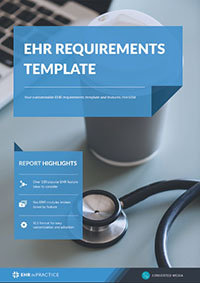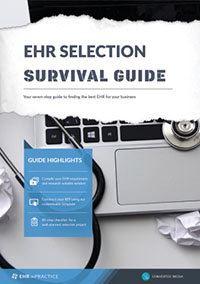Five key features to look for in an EHR e-prescribing module
Given that nine out of ten pharmacies and 70% of physicians use e-prescribing modules in their EHR, according to the Office of the National Coordinator of Health IT, it is no longer a question of whether a practice uses e-prescribing, but how this technology is used.
E-prescribing offers a number of practical benefits to a practice in that the that amount of time needed to prescribe medication to a patient, adjust dosages or order a refill can be reduced. Not only do e-prescribing capabilities enhance workflows - they can also enhance the quality of care by reducing the risk of medical errors and assisting in the coordination of care across settings. For a practice to make the most of an e-prescribing module, they should strongly consider the following key features::
1. Electronic Prior Approval (e-PA)
Estimates indicate that the often cumbersome and complicated process of obtaining prior authorizations contributes to lost productivity among providers and reduces patient medical compliance. However, e-prescribing modules offer Electronic Prior Authorization, also known as, e-PA, whereby the patient’s information and prescription information is automatically sent to the insurance provider for review. This reduces the amount of administrative effort and time required for manual prior authorizations.
2. Automated adverse drug interaction/event alerts
E-prescribing modules can reduce the risk of adverse drug interaction events by documenting timely accounts of what prescriptions patients are already taking, and whether a new prescription would interact adversely with them. Drug interaction alerts can also offer information concerning a medication’s effectiveness concerning appropriateness for treating the patient’s diagnoses, correct dosing information; contraindications and duplicate therapy alerts.
3. Medication decision support
Medication decision support, like other decision support systems, is effective in enhancing the quality of care by offering evidence-based information concerning a particular drug therapy’s effectiveness in treating a condition. When used in conjunction with an adverse drug interaction/event alerts it can add an extra layer of protection against preventable adverse drug events. According to the Center for the Advancement of Health, medication decision support has had a measurable impact on safety. U.S. hospitals have realized a 66% drop in prescription errors after switching to decision support systems.
4. Patient information and education
In line with population health management, the need to educate patients on using their medications appropriately or advising patients of potential side effects can be enhanced through patient education functionality contained in e-prescribing modules. This functionality can improve the patient experience with on-demand patient education materials, including instructions, possible side effects, and other medication-related information.
5. Formulary checking
Given the high cost of medications, patients often forgo pharmaceutical treatments due to their cost (even with insurance) or purchase the medication at a great financial hardship. Under these circumstances, a provider may benefit from formulary checking functionality in their e-prescribing module. A drug formulary is a list of prescription drugs that offer the greatest value. With this information, providers can select the most affordable options including available generics. Formulary checking functionality can also provide the necessary prescription coverage information, including possible copays and identify less expensive alternatives.
An e-prescribing module that can offer providers options to improve workflows and improve the quality of care can potentially offer significant benefits from an ROI perspective, and should be viewed in light of long-term gains in these areas.
Free white paper

50 features to look for in your next EHR
A comprehensive guide to EHR features and how they can benefit your practice

Featured white papers
Related articles
-

EHR requirements and key features: your complete guide
Our extended guide to EHR requirements - everything you need to know and more on the subject
-

5 key stakeholders in your EHR selection
Learn about the individuals that, when consulted early and often, can make your EHR selection pro...
-

5 important areas of EHR training during implementation
Successful EHR implementation is not possible without crucial EHR training




